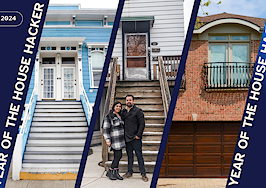The verdict is in — the old way of doing business is over. Join us at Inman Connect New York Jan. 23-25, when together we’ll conquer today’s market challenges and prepare for tomorrow’s opportunities. Defy the market and bet big on your future.
The first two years of the 2020s in the housing market were all about the relocator: the homebuyer or renter who had decided to uproot themselves and move to an area with a lower cost of living or better weather or both, possibly motivated by a newly remote job.
At the same time, the past decade or so has seen more and more far-flung populations in Europe and the United States offer up eye-catching incentives to attract newcomers to put down stakes there. Italy has most often made headlines for its picturesque villages with declining populations which have offered up historic houses for as little as One Euro.
But cities and states in the United States have launched programs of their own to attract new residents, many of which are specifically designed to attract remote workers. Most programs fall short of offering up free houses, but most offer cash payments and some cities are giving away free plots of land.
Prithwiraj Choudhury, a professor at Harvard Business School who co-authored a paper on the “Tulsa Remote” program, said that such programs have been able to find greater success with the popularization of remote work because it frees the municipalities from the worry of having to provide relocators with a job.
“If you are just incentivizing a migrant to move to a smaller town the question is: ‘Where are the jobs these people will do?’” he said. “Remote work breaks that vicious cycle because the remote workers don’t need a job.”
The success of such programs can be judged by their retention rate: How long program participants actually live in a given city, according to Choudhury. In the case of Tulsa, 90 percent of program participants stay in Tulsa for longer than a year.
For anyone looking for a new adventure in the new year, here are 10 places across the world that will pay you in cash or land to settle down there.
Maenza, Italy

Getty Images
The Italian village of Gangi was the first to make headlines for offering up its historic homes for a Euro each to combat population loss. At the time, Italy had 5,800 towns with fewer than 5,000 residents — 2,300 of which were completely abandoned or close to it — and the country was at risk of losing its rural village culture.
Villages across Italy began following Gangi’s lead, most of which were small and isolated, until Maenza — a small commune only 70 kilometers from Rome — announced its own one Euro house program in 2021, the first time a town within proximity of a major city in Italy launched such a program.
Buyers of houses in Maenza are expected to begin work repairing their homes within three months of purchasing them and finish within three years.
Tulsa, Oklahoma

Getty Images
Tulsa is one of several heartland cities that have launched programs meant to entice remote workers or “digital nomads” to their cities through land or cash. In the case of Tulsa, it’s cash. The city is offering $10,000 grants to qualifying remote workers to move to the Oil Capital of The World, with the requirement that they stay for a year.
The program offers other perks, like a coworking space for members and a separate homeownership initiative for members who want to purchase a home in Tulsa. Since launching in 2019, the initiative has brought over 2,500 remote workers to Tulsa, according to its website.
West Virginia

West Virginia. Image: Getty Images
A statewide initiative, Ascend West Virginia aims to reverse the Mountain State’s population loss and attract remote workers with cash and outdoor recreation opportunities. The program offers over $20,000 to qualified relocators, along with $8,000 in free passes for outdoor activities like skiing, whitewater rafting, mountain biking and more.
The money comes in the form of a $12,000 payment upfront once approved, then $10,000 doled out over the course of the next year and $2,000 the following year.
Vermont

Vermont. Image: Getty Images
The Green Mountain State, famous for its ski slopes and maple syrup, has struggled to grow its workforce in recent years, being the second-least populated state in the union after Wyoming.
To attract new workers, Vermont is offering to cover 100 percent of the moving costs for new residents who apply to the New Remote Worker Grant Program. That could include rental costs for moving equipment, closing costs for a primary residence, security deposit on a lease, or more.
Pipestone, Canada

Getty Images
The rural municipality in the Canadian province of Manitoba is giving away plots of land for $10 for residential use.
Interested applicants pay a $1,000 deposit and fill out an application. Once they end up building a house for their own use on the land, $990 of their original deposit is returned. The home needs to be built within a year of purchase for the deal to be honored.
Pipestone also offers tax incentives to encourage people to move there: up to $6,000 for building a new home, $4,000 for buying an existing home and $32,000 for starting a new business.
Mankato, Kansas

Getty Images
In an effort to appeal to people looking for an idyllic small-town life, the tiny (population 900) town of Mankato, Kansas is giving away plots of land for no charge, as long as you plan to erect a home on it.
The town has a total of 26 lots to give away according to its website. Mankato sits within 3000-pop Jewell County, where most residents work in agriculture or healthcare. This could be your chance to live like a 19th-century homesteader.
Albinen, Switzerland

Getty Images
Like many small, rural villages throughout Europe, Albinen, an idyllic village near Leukerbad in Valais, is at risk of extinction through attrition, with too many of its residents leaving.
To entice new residents, the village is offering $25,000 for every adult and $10,000 for every child who moves to the village.
The only requirements they must meet are to be 45 years old or younger and prepared to live in the village full-time for at least 10 years.
Rochester, New York

Getty Images
The Western New York city is attempting to breathe new life into its Rust Belt economy by attracting remote workers, and they are doing that through the Greater ROC Remote program which offers program participants up to $10,000 in relocation incentives as well as $9,000 in additional homebuyer grants.
Alaska

Alaska. Image: Getty Images
The Last Frontier is offering residents who venture into the icy north annual payments of varying amounts to put down their stakes in Alaska, the only program of its kind to offer annual payments through the Alaska Permanent Fund.
While the amount differs every year, the 2023 payment was $1,312 for every Alaska resident.
Topeka, Kansas

Getty Images
Topeka’s pilot program Choose Topeka is offering up to $15,000 for people who choose to relocate to the capital city of Kansas.
Those looking to purchase a home are eligible for $15,000 payments while those interested in renting can get $10,000. The program seeks to revitalize Topeka’s stagnant population and fill vacancies in some of its biggest industries.













